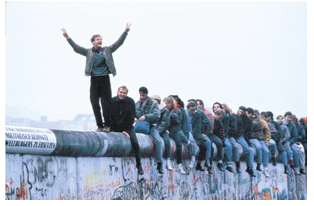RETROSPECTIVE-It was November 9, 1989.
I was at the library at Northwestern University, putting the final touches on my first book — which happened to be about Soviet foreign policy. In a mad rush to beat my deadline, I dashed out and dropped the manuscript in the FedEx box just before the truck pulled up. I headed home, feeling exhilarated.
But before I could even enjoy a celebratory drink, something on TV caught my eye.
It was the Berlin Wall. Being toppled.
The Cold War was effectively over. And the manuscript I’d just painstakingly polished had become instantly outdated.
For most Americans, the fall of the Berlin Wall remains the iconic image of the changes that took place in Europe 25 years ago. I had always assumed that it had a similar impact on people in the region.
But when I visited Eastern Europe in 2012, I discovered that, with some important exceptions, the Wall didn’t occupy such an important place in the regional imagination.
The exceptions were, of course, the Germans themselves. Nearly every German I interviewed had an interesting story to tell about that fateful day.
“I forgot time and food and everything,” West German politician Eva Quistorp told me. “It was incredible. It was better than Woodstock!”
Vera Lengsfeld, an East German activist, crossed over with some friends and found herself at a bus stop. “The regular bus was pulling in, and the bus driver was very surprised we were coming from the East,” she told me. “He dropped his usual route and gave us a sightseeing tour through West Berlin.”
But the Wall’s demise was just one of a series of monumental events. “Other moments were more memorable and stay in my mind better than the fall of the Berlin Wall,” said Hungarian activist Veronika Mora.
On that very same weekend in November, for instance, the Bulgarian Communists removed long-serving Party chief Todor Zhivkov. The Czechs and Slovaks, a mere week later, launched their own Velvet Revolution. Hungarians are more likely to remember the June 1989 reburial of Imre Nagy, the executed leader of the 1956 revolution.
The Poles, like the Hungarians, had been at the forefront of change — they had made the first political breach in the Iron Curtain that summer by electing a non-Communist government. After November 9, the spotlight shifted away. Poles generally feel damned by the faint attention.
But attention isn’t always a good thing.
Many people remember what happened in Romania in December 1989 because of its violence. Over a thousand people died during the Romanian revolution — including President Nicolae Ceausescu and his wife Elena. Many of my interviewees remembered the Christmas Day execution of the Ceausescus more clearly than the fall of the Wall.
 Still to come was the bloody dissolution of Yugoslavia and the many other conflicts that took place with the Soviet Union’s unraveling. The drastic transition from planned to market economics threw millions of people out of work and sent millions more abroad to hunt for jobs. Corruption spread like an infectious disease.
Still to come was the bloody dissolution of Yugoslavia and the many other conflicts that took place with the Soviet Union’s unraveling. The drastic transition from planned to market economics threw millions of people out of work and sent millions more abroad to hunt for jobs. Corruption spread like an infectious disease.
The expectations raised during those revolutionary days were so high that disappointment was inevitable. Even today, the gap between Europe’s East and West remains stubbornly wide: Per capita GDP in Hungary is barely half of neighboring Austria’s. Polls reveal that a majority of people in Romania, Hungary, and Serbia say life under Communism was better.
Even in wealthy Germany, the standard of living in the eastern parts of the country is lower than in the west, and unemployment remains stubbornly higher.
Still, 25 years ago, Germans had an opportunity that few are given in history: to tear down the walls of their oppression — peacefully — with their own hands. We should celebrate these few precious victories as we try, in so many ways, to tear down the walls that still divide us.
(John Feffer is the director of Foreign Policy In Focus, which ran a longer version of this essay. This perspective was provided CityWatch by OtherWords.org)
-cw
CityWatch
Vol 12 Issue 94
Pub: Nov 21, 2014
{module [862]}
{module [662]}



